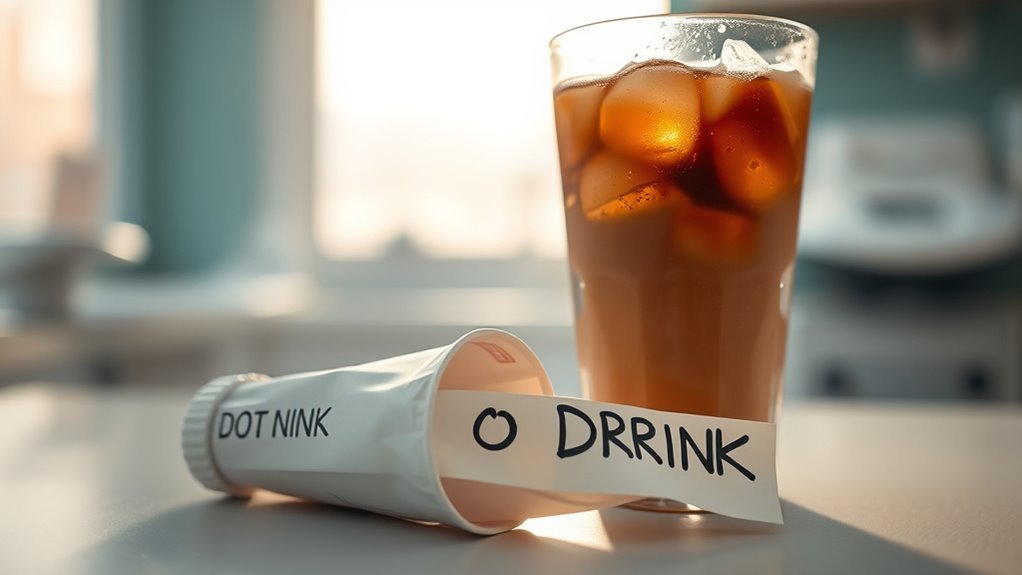Can I Drink Iced Coffee After Wisdom Teeth Removal
Drinking iced coffee after wisdom teeth removal isn’t recommended. The cold temperature can irritate sensitive gums, potentially increasing discomfort and swelling. Additionally, caffeine might interfere with your healing process and prolong recovery. It’s best to wait until your swelling subsides before considering iced coffee. Focus on hydration with safe, lukewarm, or non-acidic drinks instead. For personalized advice and to explore alternatives, you’ll want to consult further information.
Understanding Wisdom Teeth Removal and Recovery

When you undergo wisdom teeth removal, it’s vital to understand the recovery process to secure a smooth healing experience. Proper surgery preparation sets the stage for your recovery timeline. Before the procedure, confirm you follow your dentist’s instructions, which may include avoiding food and drink for several hours. Post-surgery, expect some discomfort, swelling, and bleeding, but these symptoms generally improve within a few days. Your recovery timeline typically spans one to two weeks, during which you should prioritize rest and hydration. Stick to soft foods and avoid strenuous activities to promote healing. By being well-prepared and understanding the recovery process, you’ll empower yourself to navigate this experience with confidence and ease, ultimately leading to a successful outcome.
The Role of Caffeine in Healing
Caffeine can have both positive and negative effects on your healing process after wisdom teeth removal. While it may provide a temporary boost in alertness, it’s essential to take into account its impact on hydration, which is vital for recovery. Understanding how caffeine interacts with your body during this time can help you make informed choices about your post-operative care.
Caffeine’s Effect on Healing
Although many people enjoy their daily dose of caffeine, it’s important to understand how it can influence the healing process after wisdom teeth removal. Caffeine metabolism can affect your body’s ability to heal, potentially prolonging your recovery timeline. When you consume caffeine, it stimulates your central nervous system, which might lead to increased heart rate and blood pressure. This stimulation can interfere with your body’s natural healing processes, making it harder for your wounds to close properly. Additionally, caffeine can lead to dehydration, which isn’t ideal during recovery. If you’re considering iced coffee after your procedure, it’s wise to assess how it fits into your overall health strategy, especially during the critical initial days of your healing timeline.
Hydration and Recovery Importance
While maintaining proper hydration is crucial for recovery after wisdom teeth removal, it’s important to take into account how your beverage choices, particularly those containing caffeine, can impact this process. Caffeine can contribute to dehydration, which may hinder your recovery strategies. Staying hydrated offers numerous benefits, such as reducing swelling and promoting healing. Opt for water or herbal teas to support your recovery without the risks associated with caffeinated drinks. If you’re craving iced coffee, consider waiting until your healing process is well underway. By prioritizing hydration and being mindful of your beverage choices, you can enhance your recovery and guarantee that your body has the best chance to heal effectively.
Potential Risks of Iced Coffee After Surgery

While iced coffee might seem invigorating, it’s important to reflect on the potential risks following your wisdom teeth removal. Caffeine can impact your healing process, and the cold temperature may cause sensitivity in your surgical sites. Understanding these factors can help you make safer choices during your recovery.
Caffeine and Healing
When considering your post-surgery diet, it’s essential to understand how caffeine can impact your healing process. Caffeine consumption may lead to increased heart rate and heightened anxiety, which isn’t ideal when your body needs to focus on recovery. Additionally, caffeine can interfere with sleep, and quality rest is important for best healing. If you’re someone who relies on iced coffee for that energy boost, be mindful of how it might affect your overall well-being during this significant time. While moderation is key, it’s generally wise to limit caffeine intake to support your body’s healing process effectively. Staying hydrated and nourished with balanced foods can provide the energy you need without the potential drawbacks of caffeine.
Temperature Sensitivity Risks
After wisdom teeth removal, your mouth can be particularly sensitive, making temperature a significant factor in your recovery. Consuming iced coffee may pose risks due to your oral temperature’s sensitivity issues. Cold beverages can cause discomfort, leading to increased pain or swelling.
| Potential Risks | Description |
|---|---|
| Increased Discomfort | Cold temperature may irritate sensitive gums. |
| Swelling | Iced drinks can exacerbate post-surgical swelling. |
| Delayed Healing | Sensitivity may hinder your ability to eat. |
| Nerve Sensitivity | Cold can trigger nerve reactions in healing areas. |
In light of these factors, it’s wise to contemplate avoiding iced coffee until you’ve fully healed. Always consult your dentist for personalized advice.
Temperature Sensitivity and Oral Surgery
Temperature sensitivity is a common concern following oral surgery, particularly wisdom teeth removal, as the healing process can leave your gums and teeth more reactive to extremes. You might experience temperature discomfort when consuming hot or cold beverages, which can exacerbate oral sensitivity. This heightened sensitivity is your body’s way of signaling that it’s still healing and needs care. It’s important to be mindful of what you consume during this time. Opting for lukewarm drinks can help minimize discomfort while ensuring you stay hydrated. Ignoring this sensitivity could lead to increased pain or complications, so listen to your body and choose foods and drinks that won’t aggravate your condition. Prioritizing comfort will aid in a smoother recovery.
Alternatives to Iced Coffee During Recovery

What can you sip on if iced coffee is off the table during your recovery? You’ve got plenty of tasty alternatives to keep your palate satisfied. Herbal tea is a fantastic choice; it’s soothing, caffeine-free, and can be enjoyed warm or cool, depending on your comfort level. Opt for flavors like chamomile or peppermint, which can also help with relaxation.
Another great option is smoothies. Blend up some soft fruits like bananas or berries with yogurt or almond milk for a nutritious, easy-to-consume treat. You can even throw in some spinach for an extra health boost. These alternatives not only keep you refreshed but also support your healing process, ensuring you stay nourished while you recover.
Recommendations From Dental Professionals
While you’re recovering from wisdom teeth removal, dental professionals recommend avoiding iced coffee due to its potential to irritate sensitive gums and disrupt the healing process. During this time, prioritizing post operative care is vital for your recovery. Iced coffee can contain high acidity, which may exacerbate discomfort and prolong healing. Instead, consider making dietary adjustments by opting for soothing, non-acidic beverages. Herbal teas or lukewarm water can be excellent alternatives to keep you hydrated without risking irritation. It’s important to follow your dentist’s advice on food and drink choices to guarantee you heal effectively and comfortably. Remember, taking care of your mouth now will lead to a smoother recovery and a quicker return to your favorite drinks, including iced coffee.
Listening to Your Body: When to Reintroduce Iced Coffee

As your recovery progresses, it’s crucial to listen to your body when considering reintroducing iced coffee into your diet. Pay attention to your body signals; if you experience discomfort, swelling, or sensitivity after consuming hot or cold beverages, it’s a sign you should wait a bit longer. Listening cues from your body can guide you—if you feel ready and your swelling has subsided, you may cautiously try iced coffee in moderation. Start with a small amount, observing how your mouth responds. It’s essential to guarantee your healing process isn’t compromised. Remember, everyone’s recovery is unique, so trust your instincts and don’t rush the process. Prioritize your health over cravings for that invigorating caffeine fix.
Tips for a Smooth Recovery After Oral Surgery
Recovery after oral surgery can be a delicate process, and taking the right steps can help guarantee a smooth healing experience. Start by sticking to soft foods to avoid irritation; smoothies are an excellent choice. You can blend your favorite fruits and veggies into delicious smoothie recipes that’ll provide essential nutrients while being gentle on your mouth.
Stay hydrated, but be cautious with temperature; opt for lukewarm options instead of hot drinks. Herbal teas can be soothing and beneficial for reducing inflammation. Avoid straws, as the suction can dislodge blood clots and delay healing. Finally, don’t hesitate to follow your dentist’s instructions and reach out if you have concerns—your freedom to recover is paramount.
Frequently Asked Questions
Can I Use a Straw With Iced Coffee After Surgery?
Using a straw can feel like a tempting shortcut to refreshment, but it’s a double-edged sword during your recovery. Post-surgery, it’s best to avoid straw usage for at least a few days. The suction can dislodge blood clots, complicating your healing. Instead, sip directly from a cup and focus on recovery tips like staying hydrated and eating soft foods. Your mouth will thank you as you navigate this healing journey.
How Long Should I Wait Before Drinking Iced Coffee?
You should wait at least 24 to 48 hours before drinking iced coffee to support your healing process. Caffeine can potentially interfere with your body’s recovery, leading to increased blood pressure or swelling. While you might crave that revitalizing drink, it’s crucial to prioritize your well-being. After the initial healing period, you can gradually reintroduce iced coffee, but keep an eye on how your body responds to guarantee a smooth recovery.
Will Iced Coffee Affect My Pain Medication?
Iced coffee can impact your pain management due to its caffeine effects. Caffeine may interfere with certain pain medications, diminishing their effectiveness or causing side effects. It’s essential to check with your dentist or healthcare provider about your specific medications before consuming iced coffee. They’ll guide you on the safest timeline and alternatives, ensuring you manage your pain effectively while allowing you the freedom to enjoy your favorite beverages later.
Can Iced Coffee Cause Dry Socket?
Did you know that about 2-5% of patients experience dry socket after tooth extractions? When it comes to dry socket prevention, it’s essential to avoid anything that might disrupt the healing process. Iced coffee, with its caffeine effects, can sometimes lead to increased blood flow, which may not be ideal right after surgery. To guarantee proper healing, it’s best to stick to your dentist’s recommendations and avoid iced coffee temporarily.
What if I Crave Iced Coffee During Recovery?
If you’re craving caffeine during your recovery, it’s important to be cautious. Iced coffee can be tempting, but you should prioritize your healing first. Consider waiting a few days until you’re more comfortable. If you really need that caffeine fix, opt for a mild tea or a decaffeinated option as a recovery tip. Always listen to your body and consult your dentist for personalized advice to guarantee a smooth healing process.






